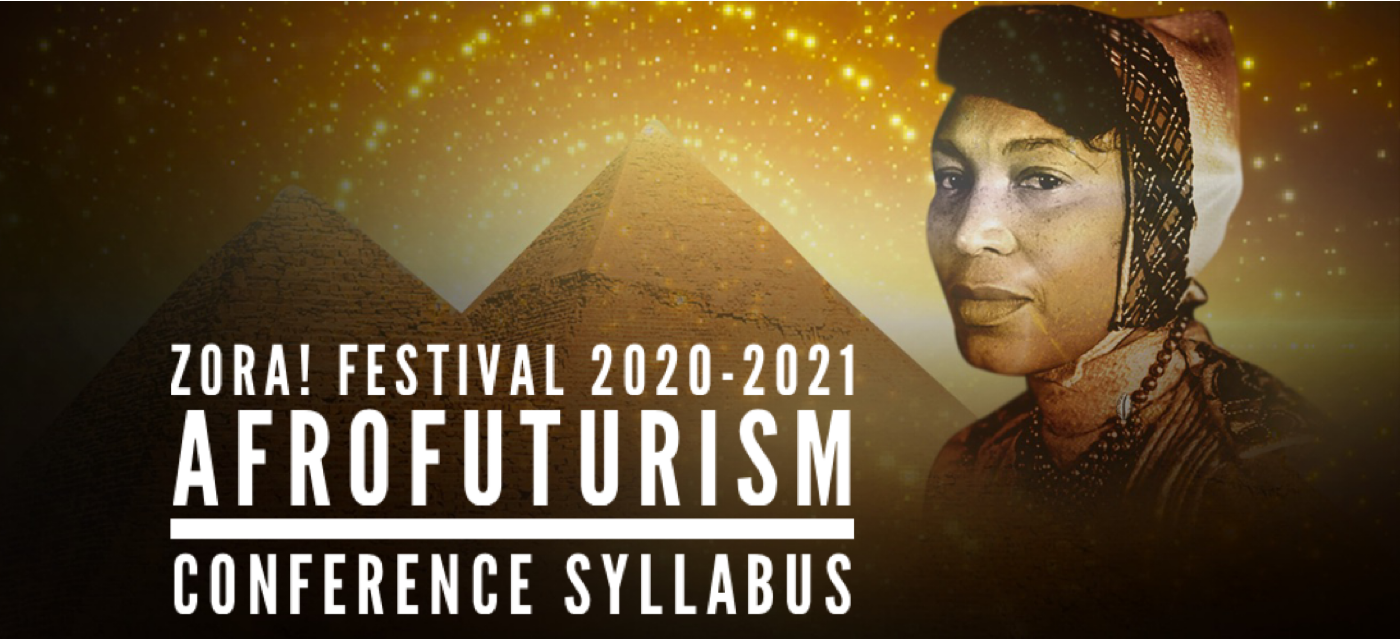2020-2021 Afrofuturism Syllabus - Week 13 - Dr. Julian Chambliss’s Spotify Playlist on The Sound of Afrofuturism: Mapping the Sonic Imagination
Welcome to Week 13 of the ZORA! Festival 2020-2021 Afrofuturism Course!
Please begin by reviewing About the Course for an introduction and orientation to the 2020-2021 Afrofuturism Syllabus, which bridges the organizing themes of the first two years of the five-year Afrofuturism Conference Cycle: "What is Afrofuturism?" and "What is the Sound of Afrofuturism?"
Note: Each week the course coordinator will release new content related to the conference themes. Content posted here will remain publicly accessible and may be incorporated into other courses, in part or in full, via links to this site. Suggested citation: French, Scot. Syllabus for ZORA! Festival Afrofuturism Course, University of Central Florida, Orlando, Fall 2020-Spring 2021. STARS, https://stars.library.ucf.edu/afrofuturism_syllabus_about/.
Conversations
In the Conversations segment we share resources featuring participants in the 2020-2021 ZORA! Festival Afrofuturism Conference.
This week’s featured Conversations include a Spotify playlist and short essay from Dr. Julian Chambliss that explore the foundational sounds of Afrofuturism and the artists that have defined its acoustic legacy.
First, listen to Dr. Julian Chambliss's Spotify playlist "The Sound of Afrofuturism: Mapping the Sonic Imagination." This thematically curated playlist [25 songs, 2 hours 6 minutes] provides a glimpse of the sonic imagination crucial to Afrofuturism.
You can find the Spotify playlist here.

Then read Dr. Chambliss's "Mapping the Sonic Imagination," a short essay reprinted from the 2021 ZORA! Festival exhibition catalog A Past Unremembered: A Black Speculative Odyssey and Afrofuturism: Mapping the Sonic Imagination (Eatonville, FL: Zora Neale Hurston Museum of Fine Arts and the Association to Preserve the Eatonville Community, 2021). Used with permission.

Explorations
In the Explorations segment we pose a series of questions for further investigation and class discussion, based on the featured Conversation. As you listen to the podcast interview, consider the following questions:
- Why is sound important to the study of Afrofuturism?
- What genres of black music does Dr. Chambliss reference in his essay and playlist?
- Can you hear Afrofuturist elements in the specific songs Dr. Chambliss selected for the Spotify playlist?
- Choose a featured artist for further exploration. Try Googling the artist’s name together with the word "Afrofuturism." What do you find?
- To what extent is Afrofuturism conveyed in the visual appearance/stage performance of the individuals/groups selected?
References
Authors, artists, and works referenced in the podcast include:
- Kodwo Eshun, "Further Considerations on Afrofuturism" (2003)
- Mark Dery, "Black to the Future" (1994)
- Erik Steinskog, Afrofuturism and Black Sound Studies (2018)
- Sun Ra
- Parliament
- LaBelle
- Earth Wind and Fire
- Lee "Scratch" Perry
- Afrika Bambaataa
- Rammellzee
- Janelle Monáe
- Flying Lotus
Up next: Dr. Regina N. Bradley, "The Demo Tape Ain’t Nobody Wanna Hear," Seminole State College Speaker Series (Jan. 27, 2021)
In partnership with the 32nd Annual Zora Neale Hurston™ Festival of the Arts and Humanities (ZORA!® Festival) & Addition Financial, the Seminole State Speaker Series presents Dr. Regina N. Bradley, author of Boondock Kollage: Stories from the Hip Hop South. Dr. Bradley will discuss the cultural significance of hip hop, with emphasis on the group OutKast and how they use hip hop to expand definitions of southern Blackness and their representations of a consistently evolving performance of race, region, and identity. The presentation will include a Q&A session.

